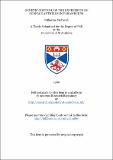Genetic control of the expression of surface antigens in paramecium
Abstract
The serotype transformation system of the ciliate Paramecium primaurelia has been examined in order to elucidate the mechanism which controls its switch in gene expression. During temperature induced transformation of stock 168, the cell switches from the synthesis of the G surface antigen protein to that of the D surface antigen protein. In Chapter I the growth conditions and serotype expression of stock 168 of P. primaurelia have been examined. In Chapter II the organisation of the macronuclear genome has been investigated. The genome of Paramedium is simple, having little repetitive DNA and a complexity only 19 times higher than that of E. coli. The transcription of the macronuclear genome has been examined in Chapter III. Paramecium, like higher eucaryotes, contains polyadenylated RNA which has a heterogeneous size range. This polyA+ RNA is present in the cell at a broad range of intracellular frequencies, the least frequent class of polyA+ RNA being present at approximately 1000 copies per cell, while the higher frequency classes are present at 105 -106 copies per cell. The least frequent class of RMA is transcribed from up to 12% of the genome in cells grown at 25˚C and expressing the G-serotype, while cells grown at 32˚C appear to transcribe up to 22% of the genome, PolyA+ RNA has been translated by a wheat-germ in vitro translation system, in which polypeptides of up to 45Kdaltons were translated. There appears to be no synthesis of MA which is larger than polyA+ RNA, in contrast to the situation in higher organisms, although an examination of transcription units showed long nascent RNP. RNA and protein synthesis has been examined during the process of transformation, there appeared to be little change in either the pattern of RNA synthesis or the spectrum of proteins present. Polysomes containing antigen mRNA were specifically precipitated with antiserum. Although there was some non-specific precipitation, there was an enrichment of RNA in the size range 10 - 12S, the size expected of RNA coding for one antigen subunit.
Type
Thesis, PhD Doctor of Philosophy
Collections
Items in the St Andrews Research Repository are protected by copyright, with all rights reserved, unless otherwise indicated.

